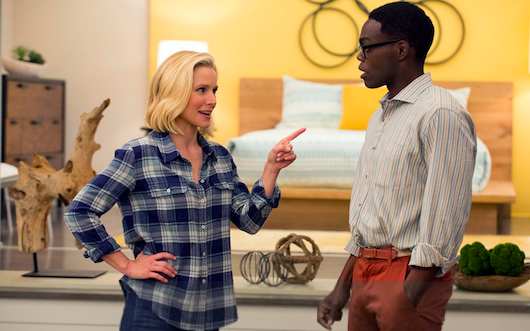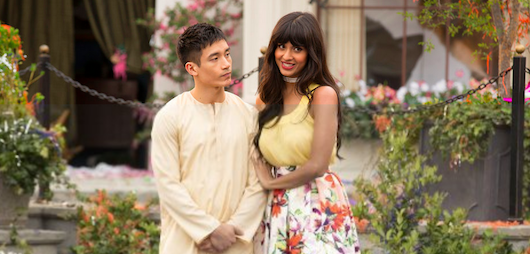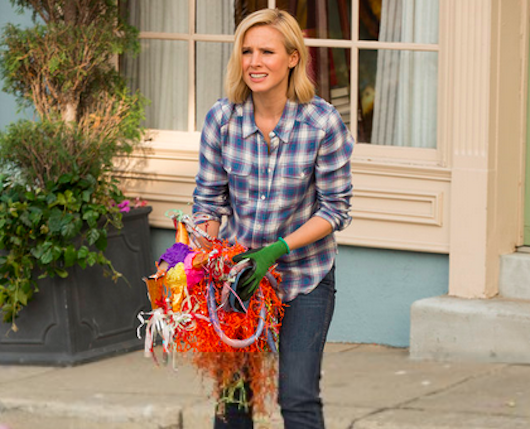 TV
TV In Which The Only People Concerned Know Nothing
 Thursday, September 22, 2016 at 10:54AM
Thursday, September 22, 2016 at 10:54AM 
Bad People
by ETHAN PETERSON
The Good Place
creator Michael Schur
NBC

There is a moment in NBC's new sitcom The Good Place where Ted Danson lists a bunch of things which are good and bad, and the numerical positive or negative value he has assigned to each. The first positive thing he shows is "eating a sandwich" and the first negative thing he shows is "buys a trashy magazine." That is the initial troubling sign that the people behind The Good Place have as little idea what it means to be a good person as the show's central character, Eleanor (Kristen Bell).
Kristen Bell is undoubtedly a good person, since you would have to be extremely virtuous to marry or even have sex once with Dax Shepard. (His face looks like the protagonist of Ratatouille.) Then she brought joy to so many young people by voicing that girl in Frozen who was absolutely boy crazy until her sexuality was thawed by leaving the chaste castle in which her parents kept her.
Maybe the creators of The Good Place could have just asked Kristen Bell what it means to be good. Everyone in this version of heaven has dedicated their lives to helping others, except for her soulmate Chidi (William Jackson Harper). Chidi speaks French, although it is translated as English to Eleanor since she does not understand the French language. Chidi was a professor of ethics and moral philosophy, although evidently he was so terrible at academia that he has to remind himself of the basics by reading Kant:

The idea of training Eleanor to be good is repulsive to Chidi, which I suppose also makes him a sort of bad person. Even though Eleanor is the only white person except for a pair of homosexuals who, somewhat inappropriately, enjoy picking up trash (this was not thought out well), she never makes notice of it. Her soulmate is from Senegal, her next-door neighbors are from different parts of Asia and Europe, and Ted Danson is really the only other genuinely white person there.
The Good Place becomes a weird hymn to white privilege, since Eleanor is transported to these environs without any actual virtue: so it must just be because of her skin color, and maybe her general complexion and appeal. Bell's handsome looks are no longer childlike, and she has become very expressive and soulful as she matures into her thirties. So far, few of her acting opportunities have utilized this new dimension, and The Good Place mainly writes jokes for her that revolve around her not being able to curse.

Sometimes we flash back to Eleanor's live in Phoenix, Arizona. You see, Hollywood writers look down on Arizona because it is nearby and thus an easy target. In Phoenix, Eleanor sold a nasal product that was composed of chalk, even though the FDA would never allow such a thing. This makes Eleanor's real life just as fanciful as her afterlife — it is a clue that you should not think about The Good Place too seriously. Creator Michael Schur emphasizes this when he recently stated in an interview that he started researching religion but gave up because it was too hard and cut into his golf time.
It is not enough that people like Schur not believe in God or any religious concepts: they cannot even be bothered to find out where they come for. Just as valid, they think, is whatever concept for the afterlife that come up with offhand during a pitch meeting. Well, atheists should be allowed their ideas too: what Schur and company have up with is basically hell — an unfunny mess of cliches, jokes stolen from Albert Brooks and physical comedy involving Ted Danson licking the sweat from his armpits. Who would willingly watch such a thing?

The aspect of The Good Place that is most insulting to its viewers is that it has no conception of how racist its ideas even are. The ethnic characters that surround Kristen Bell's Eleanor have no agency or will of their own: they simply exist to make her feel worse or better as the episode demands. The only time these empty shells ever show the slightest bit of agency is when Tahani (Jameela Jamil) decides that she and her Buddhist husband should try to cheer Ted Danson up. Why would he be sad? Danson has more hair now that he did twenty years ago.
Even Bell is afforded nothing but a basic perplexity. She becomes unsympathetic so quickly — she has no other function except to drink and enjoy her time in this new world. She is essentially uncurious and she avoids love or caring as if it these emotions were anathema to her new existence. She and her neighbors cannot be destroyed or harmed by anything in this new place, and yet they run around screaming when they see a group of giraffes stampeding down their streets. The only thing worse than a bad deed is a bad idea.
Ethan Peterson is the senior contributor to This Recording.






























